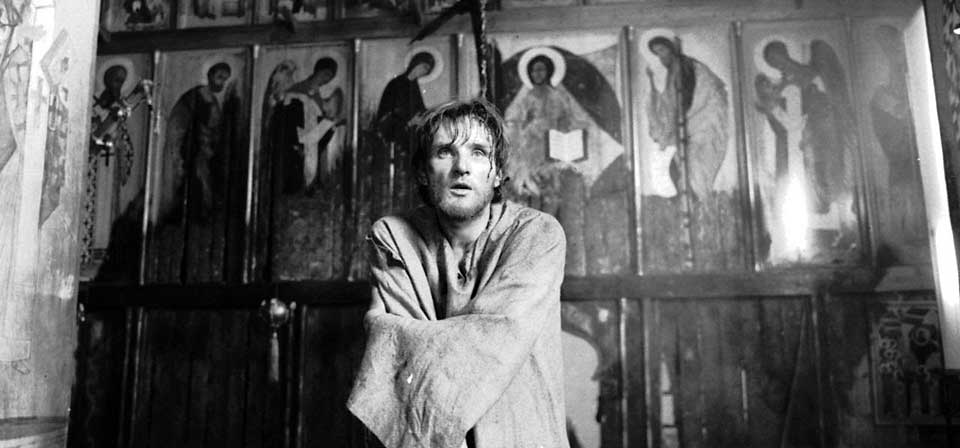The Sacrifice (1986)
I am trying to rip open the inconsolable secret in each one of you — the secret which hurts so much that you take your revenge on it by calling it names like Nostalgia and Romanticism and Adolescence. — C. S. Lewis, "The Weight of Glory"
To "rip open the inconsolable secret," to awaken the spiritual hunger for something beyond the materialistic scope of our fragmented, desacralized modern existence, was the burden of Andrei Tarkovsky, cinematic poet laureate of the Russian soul.
Caveat Spectator
A sequence involving nonmarital sex in a pagan-magical context (no nudity); murky philosophical musings. Subtitles.With dreamlike logic and poetic images, contemplative extended takes and fluid tracking shots, Tarkovsky sought to expose the fragmentedness and sterility of desacralized modernity, to stir in the viewer a longing for spiritual truth, spiritual healing, spiritual existence, to communicate hunger for transcendence and meaning amid the vagaries of time and space.
The Sacrifice (Offret — Sacrificatio), Tarkovsky’s final film, is commonly called his last will and testament. It is a final plea and warning to mankind to turn abandon its self-destructive course, to rediscover instead the capacity for spirituality, in particular for self-sacrifice for the sake of others.
The film’s thesis hangs between the two tentpoles of two striking extended takes, one at the beginning of the film and one toward the end. The first is a quiet, ten-minute dolly shot of a meandering philosophical conversation between a rider on an equally meandering bicycle and another man on foot: a case study in intellectual aridity. "Words, words, words," says protagonist Alexander (Erland Josephson). "If only we could shut up and do something."
This proposal is stunningly, literally realized in the climactic extended take — a shorter, static, but far more dramatic shot of an act that is unexplained and unexplainable in rational terms, but has a significance to Alexander that cannot be reduced to words.
A number of Tarkovsky’s films begin or end with classical paintings or works of art that resonate with or illustrate the film’s themes. Here he opens with Leonardo’s unfinished Adoration of the Magi, establishing the theme of a gift or sacrifice offered to God, a theme reinforced by his use of Bach’s Matthew Passion.
The film’s theme is complicated by the joining of two originally separate story ideas, one involving a holocaust offered in satisfaction of a vow to God, the other borrowed from a pagan fertility-cult ritual. As with Andrei Rublev, perhaps, there is a dialectic of Christian and pagan ideas.
Yet where in Andrei Rublev the protagonist rejected the advances of an alluring pagan witch as incompatible with Christian love, in The Sacrifice the protagonist behaves, or must behave, quite differently, and no contradiction is seen between the Christian and pagan approaches. What can this juxtaposition of images mean?
Tarkovsky called the film a parable and said its events could be interpreted more than one way. Some find the synthesis unconvincing, and feel that the film is simply flawed.
A novel solution proposed by one writer is that Tarkovsky offers two contradictory supernatural elements in order to deflect attention from the particulars of the supernatural element and emphasize the protagonist’s self-sacrifice. Yet the pagan element seems less persuasive as a sacrifice than as a general bid for a mystical and transcendent response.
Perhaps there is no reconciling the dual invocations of the supernatural. Perhaps the very redundancy and conflict of the protagonist’s efforts to redress the wrongs of an out-of-control world suggests the depth and desperation of our inconsolable secret, the grievousness of our wound. Perhaps existential desperation, even to the point of contradiction, is preferable to numb apathy or rationalistic intellectual sterility.
Related

Andrei Rublev (1969)
The notion of art as a "religious experience" is sometimes bandied about too freely. Tarkovsky is one of a handful of filmmakers for whom this ideal was no cheap or desanctified metaphor, but literal truth.
Solaris (2002)
This year’s Solaris from writer-director Steven Soderbergh (Erin Brockovich is part of an ongoing trend toward science fiction aspiring to the tradition of 2001. Not long ago, science fiction had become a wasteland of forgettable, mindless action flicks. The year 2000, for example, gave us Red Planet, Battlefield Earth, The 6th Day, Hollow Man, Pitch Black, and Supernova (as well as Mission to Mars, which didn’t fit the mindless-action pattern but managed to be lame anyway). Even the previous year’s The Matrix was notable primarily for its kinetic impact and craft; the story, though clever, was long on allusions and short on genuine resonance.
Recent
- Benoit Blanc goes to church: Mysteries and faith in Wake Up Dead Man
- Are there too many Jesus movies?
- Antidote to the digital revolution: Carlo Acutis: Roadmap to Reality
- “Not I, But God”: Interview with Carlo Acutis: Roadmap to Reality director Tim Moriarty
- Gunn’s Superman is silly and sincere, and that’s good. It could be smarter.
Home Video
Copyright © 2000– Steven D. Greydanus. All rights reserved.